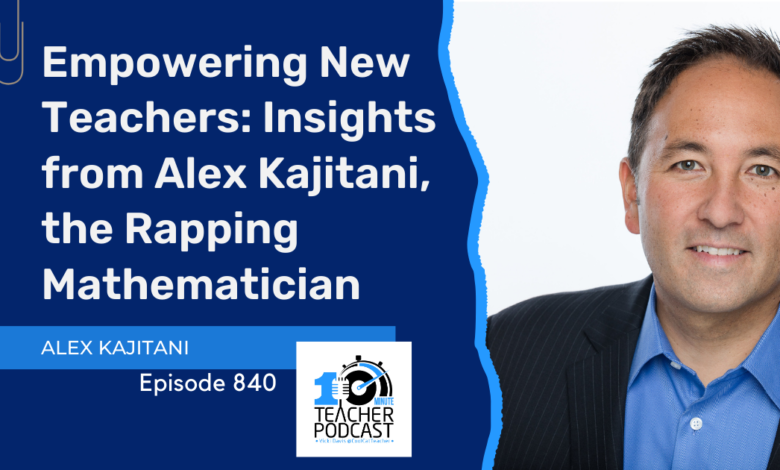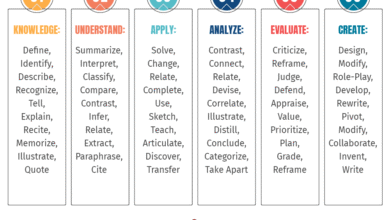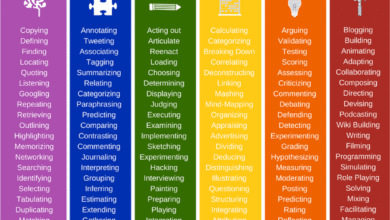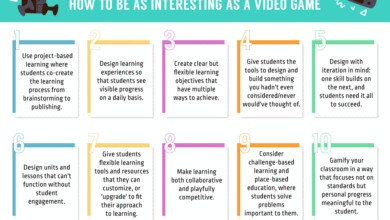Insights from the Alex Kajitani

Transcript is AI generated and checked by me. Please contact me if you see errors that should be fixed. Thank you.
Transcript
Vicki Davis (00:01)
New teachers, we are so glad that you are in the profession of education, but it’s not always easy. You are going to love today’s guest, Alex Kajitani. known as the rapping mathematician, but he has a message for all of us. He’s been honored at the White House. He’s been on the CBS Evening News.
2009 California Teacher of the Year and a top four finalist for National Teacher of the Year. we’re actually talking about this book. “You’re a teacher now. What’s next?” So Alex, as new teachers finish up their first year, maybe their second year, what are your words to them?
Alex Kajitani (00:44)
you know, this is my 22nd year in education and I still vividly remember, that first year, that second year. And so I think the most important thing for new teachers to know, especially as they’re starting to close out this year is that you’re not alone, The things that you experienced over this school year, the things that you struggled with, the things that you did really well.
the reasons that you may not want to come back, the reasons why you should come back, they’re really universal. it’s really important to just keep in mind that you’re not alone and all of the wonderful things are going to come back and happen again next year, and all of the challenging things, you’re going to come back and do even better next year. we are at this critical time in education where we need new teachers to…
continue to keep on going, to keep making the impact that they’re making, because it really is important to each and every student and to our entire profession.
Vicki Davis (01:43)
Well, and don’t we need perspective?
I just remember that first couple of years of teaching for me was really hard because I knew I needed hope. So like, is there hope for new teachers if the year isn’t going quite like they wanted, or they’re not quite got the classroom management down yet, or they’re just frustrated, is there hope for them?
Alex Kajitani (02:04)
I think absolutely. one of the advantages to being in a profession like teaching is you can start anew at so many different points. after spring break or after the holiday break. You can start anew on Monday morning. And really the truth is.
Vicki Davis (02:22)
Mm-hmm.
Alex Kajitani (02:23)
for many of us who teach different classes, you can start anew that very next class. it’s not of course as easy as it sounds. It’s not that simple, I know. But every single day is an opportunity to try something a little different, to start something, a little bit better than you have or with a different perspective or trying something different or trying something another way. And so I really think that, not only is there hope, there is hope.
every single day, every single semester, every time there is any sort of break in the action. but it’s also an opportunity to come back and say, you know what? I may not have done that so great or things might’ve gotten a little out of control, but I’m determined to come back and make it a little bit better. And what I have found still, as having taught all these years, is that quite often, our best days of teaching
come right on the heels of our worst days of teaching. Because when things happen that don’t go so well, we have a choice to make as teachers, and that is to sulk about it, to sort of throw up our hands and say, ah, you know, forget this, or to say, you know what, I’m not going to take this personally, I’m going to grow because of it, and how can I do it even better the next time? And when we do that, we come back in, and like I said, usually our.
Vicki Davis (03:16)
Mm-hmm.
Alex Kajitani (03:41)
best days of teaching come right after our worst days.
Vicki Davis (03:44)
I would absolutely agree with that. My mom was a teacher and she’s the one who mentored me so often. And she told me very early because I teach technology, you know, how you reboot a computer, you can reboot your classroom anytime you want to. And all it takes is saying, okay, guys, this is what didn’t go right today. How you came in the classroom, because for me, you know, I’ve always learned it’s how they come in, how does that start? And usually when I have those rough days, it’s when my classroom didn’t boot up. Right.
so I’ll say, okay, this is what’s going to happen different tomorrow. And, set expectations for how it would get to change. And here’s the thing. If somebody’s doing it successfully, then there’s a pattern for doing it successfully, right?
Alex Kajitani (04:26)
Absolutely. one of the best things that I learned as a new teacher is to see everything that happens in your classroom as good information, So if you are having trouble after you’re prompting them to quiet down and you’re having trouble getting your class to quiet down, instead of saying, these kids don’t know how to quiet down.
just taking a deep breath and going, you know what? I tried to get them to quiet down this way. It didn’t work very well. they were still loud after 30 seconds. That’s really good information. And I’m going to take this information and I’m going to go ask some of the other teachers how they get their class to quiet down quickly. And so seeing everything that happens that instead of, like I said, taking it personally, instead of feeling like, oh, this is a disaster, just saying, huh.
Vicki Davis (05:02)
Mm-hmm.
Alex Kajitani (05:12)
this is really good information. I’m going to take this information and I’m going to do something with that. one of the biggest pieces of advice that we give in you’re a teacher now, what’s next is that the best thing that you can do is surround yourself with good people. Surround yourself with, the most effective teachers on campus. And if you don’t know who they are, it’s very simple. Go ask your principal, say, hey, who are some of the most effective teachers on this campus? And then…
Vicki Davis (05:28)
Mmm.
Alex Kajitani (05:38)
Go talk to them. And then after you talk to them, ask them, hey, who else should I talk to? Because the best teachers, the effective teachers on campus, they know who the other ones are. And when we surround ourselves with good people, we put ourselves directly in the path of excellence. And then we have no choice but to become excellent ourselves.
Vicki Davis (05:48)
They do.
Yeah, because we have to control what we can control. And yes, kids need accountability. And yes, sometimes we get the kids that are struggling. But observing amazing teachers, I’m right at where you are, right around 22 years of teaching. And when I observe great teachers, I’m like, oh, I mean, cause we can still learn, can’t we?
Alex Kajitani (06:22)
Yeah, there is all sorts of incredible professional development out there. Hey, I, I lead much of it myself, but there is no professional development better than being able to go into another teacher’s classroom, watch them teach, especially if they’re teaching some of the same students that you have, or some of the same students that you’re struggling with, watch them teach. And then you’ve got this gift of being able to go in at lunch, being able to go in after school or,
Vicki Davis (06:41)
Ah.
Alex Kajitani (06:50)
anytime that you’re free or you’re both free and saying, hey, I noticed you did this. How did you do that? Or how did you set that up? Or where did you get the idea to decorate your walls this way? I mean, getting ideas from other teachers really is one of the greatest things that we can possibly do. And I will say that, when I was just coming up, everyone said, be sure to steal ideas from other teachers. And I never really liked that term stealing ideas. Because
Vicki Davis (07:15)
Mm.
Alex Kajitani (07:15)
I never thought we were taking something away from other teachers. And so I’ve always said, be able to adapt ideas from other teachers because you’re going to take another idea that you see from another teacher. You’re not just going to take it. You’re not going to take it away from them. You’re going to take it. You’re going to make it your own. You’re going to put your own spin on it and you’re going to adapt it to what it is that you need, how it is that you run your class. So let’s stop stealing. Let’s start adapting.
Vicki Davis (07:22)
Ahhhh.
I love that. Now, what are the new teachers that are frustrated or upset say to you when they come up to you after a PD session and how do you counsel them?
Alex Kajitani (07:53)
Yeah, i’ve been working with new teachers for many years now both, you know in my own district as well as across school districts Across the country and I think that for new teachers one of the things that throws them off During that first year of teaching is the actual amount of work that is required in order to simply be a teacher, right? a lot of us just we didn’t see this coming, right? It’s it, we thought okay
we were going to spend some extra time and maybe some time on the weekends and things like that. And then suddenly in those first year or two, many of us find ourselves absolutely inundated with what feels like work we could always be doing all of the time. And so one of the things that I think is really critical for all of us is to really help new teachers.
Vicki Davis (08:31)
Yeah.
Alex Kajitani (08:42)
be healthy and stay healthy. And by healthy, I don’t just mean physically, but I mean well balanced as well. You know, I live here in San Diego, California. I’ve been a surfer my entire life. I will never forget my first year of teaching when one of my colleagues came in and said, Hey Alex, every Thursday afternoon, as soon as the bell rings, we drop our stuff. We go surfing for an hour. Why don’t you come join us? Well, I started to look forward to those Thursday surfs.
Vicki Davis (08:44)
Hmm
Alex Kajitani (09:09)
every single week. And yes, I knew it meant I was going to have to stay up a little bit longer later that night to get everything ready. But I did it feeling so refreshed and feeling the camaraderie of doing something, with my colleagues. And so whether it is just grabbing them to take a quick walk around the track after school or bringing them a basket of fresh fruit from your yard or whatever it is, just finding ways to really help new teachers.
Vicki Davis (09:22)
Mm.
Alex Kajitani (09:35)
stay healthy and get healthy. And the other thing that I love doing with new teachers is we gotta just celebrate those little milestones. not necessarily the big things, but to many teachers finishing your grading may not be a big deal, but to a new teacher finishing your grades and your grade book, you know, that first time, it’s a really big deal. I’ll never forget the first time I broke up my first middle school fight. And I was, I mean, adrenaline pumping. I was so stressed.
And one of the teachers in the next room, he came over with a bottle of Gatorade and a little white gym towel for me, just kind of like what they bring box with it. And I had such a good laugh at it. And he said, hey, congratulations on breaking up your first middle school fight. And so it took a situation that I was going to take home with me and really stress out about and turned it into something that I could hold perspective on, that I could laugh about, and that I could really look forward to.
Vicki Davis (10:24)
Mm-hmm.
Alex Kajitani (10:30)
coming back the next day. And so, supporting new teachers isn’t necessarily in all of the big things we do. Those are obviously important as well, but sometimes it’s in just the little interactions that we have with them on a day-to-day basis.
Vicki Davis (10:45)
I’m just thinking I had a particularly rough day and she brought me this little tiny snicker bar and said, sometimes you just need a little snicker, right? And had a little sticky note on it. And I’m like, Oh, and like helping new teachers have perspective of like, it, this is part of teaching. No, it’s not our favorite part, but it is part of teaching. you’ve encouraged me that.
Alex Kajitani (10:51)
That’s right.
Vicki Davis (11:05)
that I want to be that for the first and the second and the third and the teachers who hadn’t been around as long because that’s kind of part of our legacy, isn’t it Alex?
Alex Kajitani (11:16)
I think so too. the reason we teach is that we want to live forever. I mean, machines fall apart and beauty fades and money runs out. But when we teach, when we share our ideas, those are really the only thing that can continue to go on from one generation to the next. And so when people ask me why I teach, I often say, oh, because I want to live forever. And I get a weird look. But when I explain why, when I explain that look, we’re
Vicki Davis (11:37)
Hmm
Alex Kajitani (11:41)
We’re passing on our ideas not only to our students, but to the next generation of teachers as well. Then we are truly living forever.
Vicki Davis (11:49)
Oh, that’s fantastic. The book is, You’re a Teacher Now, What’s Next by Alex Kajitani. And Alex, thank you for continuing to work with educators,
our profession is so important and we need to be encouraging each other, be there for each other and help all of us keep perspective. So thanks Alex for giving all of us perspective today.
Alex Kajitani (12:11)
Oh, it’s such an honor. And along with my co-author, Tom we’ve been working with new teachers for many, many years across the country. And this book really aims at answering the critical questions that new teachers have. Everything from how do I set up my classroom to how do I manage my classroom to what do I do when a student doesn’t behave like I want them to. And it’s written in really a fun conversational tone that feels like you’re just out having a cup of coffee with a friend.
Vicki Davis (12:38)
Wonderful. Thanks for coming on the show.
Alex Kajitani (12:40)
Thanks so much. Keep up the great work, Vicki.



